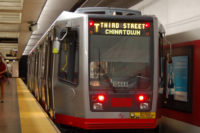San Francisco Subway TBMs Dig Deep to Overcome Tunnel Challenges
Tunneling 100 ft below a busy city with varying substructure is a delicate job, especially when the work comes within 8 ft of existing tunnels. Such is the case on San Francisco's new $1.5-billion Central Subway Project, which began major subterranean excavation last month.
"The tunnels pass through both soft ground and Franciscan formation, which is heterogeneous rock that is not predictable except in its unpredictability," says Sarah Wilson, a San Francisco Municipal Transportation Agency (SFMTA) resident engineer.
While underground conditions will be tricky, the project's twin earth-pressure-balance tunnel-boring machines will be able to adjust their blades and cut through any sand, dirt or rock, says Wilson. The TBMs, dubbed Mom Chung and Big Alma, are each 350 ft long and weigh 750 tons.
Mom Chung was first out of the 450-ft-long launch box. Over the next 10 months, she will travel north, creating a 1.7-mile-long tunnel. Big Alma will begin digging a southbound parallel tunnel later this month.
The tunnels are the main component of the Central Subway Project, which is extending the Muni Metro T Third Line through one of the most densely populated neighborhoods in the U.S. with three new underground stations and one at street level.
A joint venture of Barnard Impregilo Healy, Bozeman, Mont., is the lead tunneling contractor. Tutor Perini, Sylmar, Calif., is leading construction of stations, tracks and operating systems. Work on the line is scheduled to wrap up in 2019.
To prevent and control ground and adjacent structure settlement, the team will use compensation grouting, in which a horizontal array of grout pipes is installed into a shaft drilled down next to the tunnel alignment. "We are basically preconditioning the ground and making it homogeneous so that there are no surprises for the crossing," says John Funghi, SFMTA program director.




